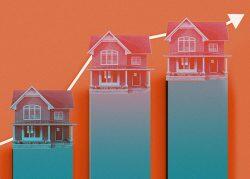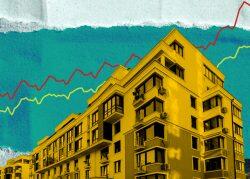In January, a flood of buyers hit what was already a hyper-competitive residential market. At the time, the Federal Reserve was signaling its first interest rate hike in more than three years, and more ahead.
“Once the Fed said, ‘We’re going to start raising the interest rates in March,’ we saw everyone running to the exit, and people were just putting [in] offers left and right,” said Kobi Lahav, the director of sales at Living NY. “It was super busy.”
Interest rates and, consequently, mortgage rates did indeed rise. From their historic lows at the beginning of the year, mortgage rates have now climbed by nearly 1.5 percentage points, the most rapid increase since 1994. More than half of that rise was in March, as rates shot up from 4.09 percent to 4.8 percent.
Agents spoke with The Real Deal about how the rapid change is affecting the market and their clientele.
Read more



Some are trying to offer some perspective to shell-shocked shoppers.
“We’ve had low interest rates for so long, we’re really spoiled. And even though they’re at historic lows, people are talking about them like they’re so high,” said Diana Sutherlin, a broker with Compass, who works in the Downtown Jersey City and Hoboken markets. “I remember when they were in the double digits years and years ago.”
Interest rates peaked in 1981 when the annual average was 16.63 percent, then finished the decade at around 10 percent. It then fell slowly, dipping below 7 percent in 1998.
Mortgage rates steadily declined from 8.05 percent in 2000 to the high-5 percent range in 2003, helping to fuel the housing bubble. After it burst, triggering a recession in late 2007, the Federal Reserve spent years aiding the recovery by pushing interest rates down. Mortgage rates began the 2010s at 4.69 percent and were in the mid-3 percent range by 2012 before rising later in the decade.
High rates generally deter homebuyers, or cause them to reduce their target price. But rising rates can spur buyers to quickly secure homes before they go even higher. This year has been a classic example.

(L-R) Keller Williams’ Anna Tchorbadjiev, Gino Bello, an agent with Houlihan Lawrence in Westchester and Bianca D’Alessio of Nest Seekers International (KWNYC, Gino Bello Homes, Nest Seekers International)
“The fear and acceptance of rate increases have been a bonanza residential transaction accelerator,” Nikki Field of Sotheby’s International Realty said.
First-time homebuyers are the most sensitive to the rate increases, especially as rising rents have simultaneously been pressuring them to buy. The median Manhattan rent broke records in February, hitting $3,700, up from the previous high of $3,450 in April 2020, according to a report by appraisal firm Miller Samuel for Douglas Elliman.
“When you’re going from paying a set amount of rent to getting your first mortgage and that mortgage increasing by $600, $700 within a few months, it gives buyers less buying power,” said Gino Bello, an agent with Houlihan Lawrence in Westchester. “They could have bought a more expensive home in December with the same amount of money that they’re spending now.”
While some buyers ramped up their bids, others concluded that they had missed the boat. Anna Tchorbadjiev, an agent with Keller Willams, had two millennial shoppers give up because of rising mortgage rates and competition from cash buyers.
“They got scared,” Tchorbadjiev said. “They got pushed back into renting instead of buying because they’re getting outbid and pushed out of the market by more seasoned and wealthier buyers.”
Melissa Cohn, a senior executive at William Raveis Mortgage, said with listings still scarce, the loss of discouraged shoppers does not figure to kill the market’s momentum.
“As long as inventory levels remain so low, the real estate market will continue to flourish,” Cohn said. “In fact, many believe that prices in areas that have low inventories will continue to go up for at least the remainder of the year.”
Richard Grossman, president of brokerage at Avenue 8, agreed, although he believes the Federal Reserve acted in part to cool off the housing market.
“The reality is that our marketplaces for the most part will be able to tolerate some of these increases,” Grossman said.
Bianca D’Alessio of Nest Seekers International called the rate-hike impact a “recalibration” of the market. Rather than giving up, buyers will size down, looking for one-bedrooms and studios instead of the larger and more luxurious apartments that gained popularity in the past year.
“It’s almost a trickle effect across the board,” D’Alessio said.
Rising inflation — which motivated the Fed to seek higher interest rates — is motivating some buyers to buy real estate as a hedge.
“People are wanting to protect their money because they see where the whole world is right now. It’s a very precarious situation, to say the least,” said Tchorbadjiev. “So a lot of people are just parking their money into real estate, because real estate does appreciate over time and they just want to get in while they can.”
Although cash buyers are not subject to rising mortgage rates, some have stepped back rather than try to win bidding wars with buyers desperate to lock in a low mortgage rate.
“I’m seeing some of my cash buyers a little hesitant to play in that playground because they don’t have to,” said Lindsay Barton Barrett, a broker with Douglas Elliman.
